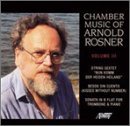| All Artists: Arnold Rosner, Pinotage, Sestetto Agosto, Angelina Tallaj Title: Chamber Music of Arnold Rosner, Vol. 3 Members Wishing: 0 Total Copies: 0 Label: Albany Records Release Date: 2/25/2003 Genre: Classical Styles: Chamber Music, Historical Periods, Classical (c.1770-1830) Number of Discs: 1 SwapaCD Credits: 1 UPCs: 034061055327, 034061055327 |
Search - Arnold Rosner, Pinotage, Sestetto Agosto :: Chamber Music of Arnold Rosner, Vol. 3
 | Arnold Rosner, Pinotage, Sestetto Agosto Chamber Music of Arnold Rosner, Vol. 3 Genre: Classical |
Larger Image |
CD Details |
CD ReviewsThree winners J Scott Morrison | Middlebury VT, USA | 03/08/2003 (5 out of 5 stars) "This disc of chamber music by the distinguished American composer, Arnold Rosner (b. 1945) is the third in a continuing series from Albany Records. It contains three pieces, and they couldn't be more different from each other. There is a lush string sextet, an impressionistic set of Spanish songs for mezzo and three instruments, and an epic sonata for trombone and piano. The sextet was inspired, the composer says, by those of Brahms and Dvorak and indeed there are harmonic procedures in this piece that do remind one of the juicy consonance of those late Romantic masters. It is based on a modal pre-Bachian version of the Lutheran hymn 'Nun komm der Heiden Heiland' which peeks through in the first movement and bursts forth gloriously towards the end of the second, thus satisfying a dimly-felt yearning on the listener's part. Rosner's style makes use of modal counterpoint that sometimes reminds one of Vaughan Williams or Hovhaness. This is evident throughout, and particularly in the fugal section of the first movement, which is a set of variations using all manner of classical procedures. The second movement, subtitled 'Motet,' is essentially a song. And, indeed, if I had to use one adjective to describe this piece, or even Rosner's overall oeuvre, it would be 'songful.' Every line sings. The piece was written in the 1970s but extensively revised in the 1990s for violinist Paul Vanderwerf and five colleagues from the Chicago area; that group is heard here. With the exception of some uncertain intonation in a first-movement cello solo, it is played gorgeously.'Besos sin cuento' ('Kisses Without Number') is a set of six songs based on Spanish poems from the Renaissance. It is sung lusciously here by mezzo Julia Bentley, accompanied by a Debussyan trio of flute, viola, and harp. These are lovesick poems often with homely folk-tinged images (e.g. 'Three things hold my heart prisoner of love: the fair Inez, the ham and eggplant with cheese'). Rosner devises a setting that couldn't be more Spanish somehow, with rhythms and harmonies that evoke the sensuous and languorous air of that enchanted country. Think of a Spanish 'Songs of the Auvergne.' Before coming to this set of songs, I had thought Rosner wrote almost entirely in a noble or dignified style. The humor and sexiness of this music belies that impression.Rosner has said that he, inspired by Hindemith and Nielsen, has wanted to write a sonata or concerto for all the instruments of the orchestra. Only bassoon and double bass players remain unserved. The trombone sonata is classical in form. The first movement is an extended three-part invention with lots of open fourths and fifths, giving it a medieval feel. The second movement is a musing and melancholy song - there's that word again! - in slightly unsettling 7/8 meter. The declamatory last movement, with assertive Hindemithian counterpoint, is cast in classic sonata form with two contrasting themes and comes to a blazing peroration, bringing this outstanding disc to a satisfying conclusion.The sound and production values, as well as the performances, are exemplary. All hail to the musicians and the three engineers involved and to the production by John Proffitt of Albany Records." Addendum to my earlier review J Scott Morrison | Middlebury VT, USA | 03/14/2003 (5 out of 5 stars) "In my review of the Arnold Rosner disc, I commented about a patch of uncertain intonation on the part of the first cellist in the String Sextet. I've since heard from the composer (who had been sent my review by a friend who, unbeknownst to me, also knows the composer) and he took pains to tell me that the cellist's intonation was precisely what the score indicated.To quote him:"Variation 5 features the concertante cello solo, with colorful consonant chords for the other players. I wanted some melodic and harmonic "bravura" and tension, partially as this prepares the hearer for the real climax coming in the fugue which is Variation 6. Thus many of the choices (whether you would agree or disagree) of specific notes create some level of dissonance that may be unexpected. To give just one example, the last note of the long solo is an A-flat against a C harmony; one may anticipate a G. [The cellist] plays VERY sensitively, [and] uses some slides (some are written in as glissandi), good bowing and dynamic control, and possibly this makes some notes sound less clear and pointed than a less subtle players rendition. Anyway, as you have gathered, my point is that [his] playing in that variation, at least to my ear, is excellent and without fault."Given this, I would certain withdraw my criticism and would want to call your attention to this correction from the composer himself. One simply can't argue that something I thought was tentative playing was, in fact, what the composer wanted all along. It's certainly HIS call in this matter."
|
